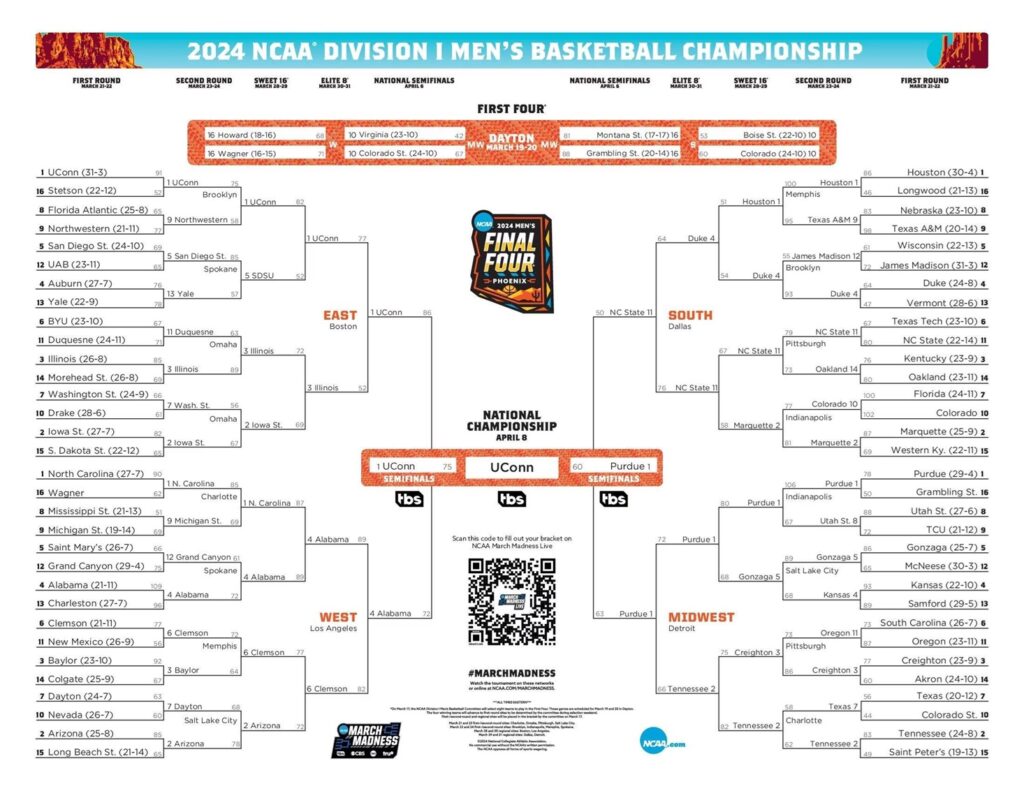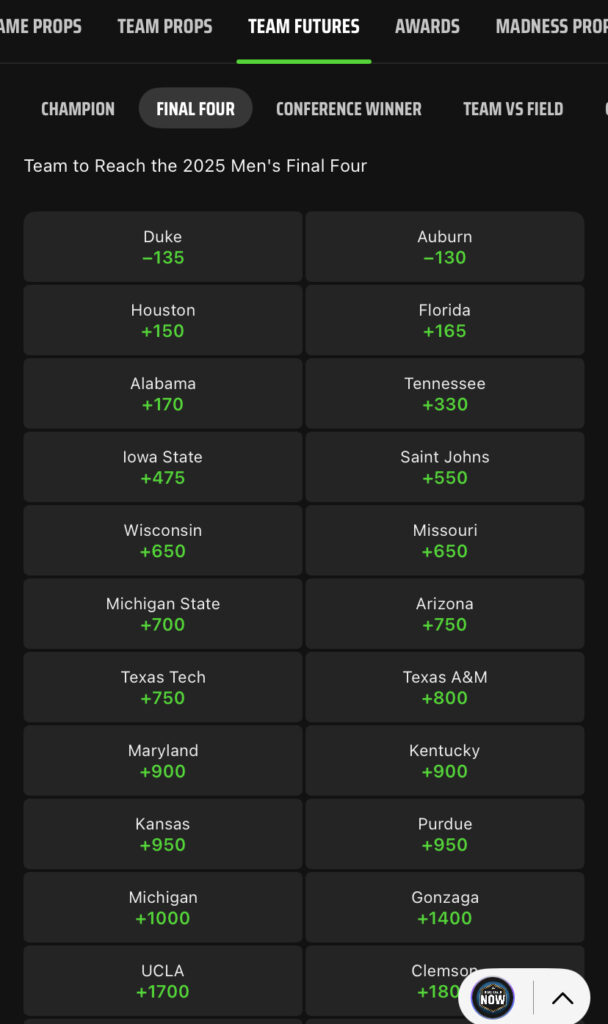March Madness Bracket Tips: Trends & Mistakes to Know

March Madness brings friends, family, and coworkers together every year as they pool together and fill out brackets for the renowned college basketball tournament. This page provides March Madness bracket tips. Think of it as a guide, of sorts, to fill out your March Madness bracket.
Picking who moves on every round, who makes the Final Four, and who ultimately wins the national championship is a lot of fun, even if you don’t know anything about college basketball.
March Madness has some of the most unpredictable moments in all of sports.
There are a lot of surprise upsets, which puts knowledgeable NCAA fans at somewhat of a disadvantage. If you’re going into March Madness for the first time, then your lack of bias towards certain teams can actually help you.
Still, there are a few essential tips you should be aware of that could help you win your bracket pool. You have to do your research heading into the first weekend if you want to be successful.
Here’s a few pointers to get you started!
Jump to: Tips for Picking Winners in Every Round / Bracket Tips for March Madness / Avoid These Common March Madness Bracket Mistakes / March Madness Bracket Tips FAQ
Tips for Picking Winners in Every Round
Before we get into the nitty-gritty of March Madness brackets, let’s explore the men’s tournament structure and how it affects your bracket. We also have an in-depth guide to the women’s March Madness tournament and encourage you to fill out a bracket for that too.
Tournament Structure and How to Win Your Bracket
As March Madness begins, 68 teams are ranked and sorted into an NCAA bracket on a day called “Selection Sunday” after the conference tournaments. Once the matchups are set, eight teams — tge four lowest-seeded automatic bids and four lowest-seeded at-large bids — participate in a series of play-in games known as the First Four. This makes up the early rounds of the tournament.

The four winners of these games advance to the first round, also known as the round of 64. The top 64 teams in the nation get split up into four regional tournaments (East, South, West, and Midwest) and the clubs in each division are ranked with seeds numbered 1-16.
The best teams with a high seed ranking might seem like perfect picks, but that’s not always the case. We’ll discuss that later on.
Here’s the bracket from last year:

The teams play each other and advance to the second round through single-elimination games. After the second round, known as the round of 32, there are three more rounds with notable names:
- Sweet 16
- Elite Eight
- Final Four
The bracket culminates in a title game that determines the national champion and winner of the March Madness tournament.
It’s your job to pick the winner of each game leading up to the finals. Predicting the tourney winner is difficult, and creating a perfect bracket is nearly impossible – there are over 9.2 quintillion combinations you could make from this year’s bracket! It’s so unlikely that Warren Buffet offers his Berkshire Hathaway employees $1 million a year for life should they fill out a perfect bracket.
At the end of the tournament, you compare your results with anyone else in your betting pool. Whoever has the most points is declared the winner, taking home the bragging rights and whatever prize money might be involved.
Correct entries in each round are worth a different number of points that count towards your final total. Some brackets may differ, but most follow a system where choosing the tournament champion is worth a cool 32 points.
Here’s a full breakdown:
- 1 point for each winner you choose in the first round
- 2 points for each winner you choose in the second round
- 4 points for each winner you choose in the Sweet 16
- 8 points for each winner you choose in the Elite 8
- 16 points for each winner you choose in the Final Four
- 32 points for correctly choosing the tournament champion
As you can see, the games in the first round aren’t worth very many points. Sure, you have 32 games where you could earn points, but don’t worry too much about your bracket in this round. It’s wise to build your bracket starting with the Final Four where the games are worth 16 points.
What to Expect in Each Round
It might sound cliché, but when it comes to March Madness, you should expect the unexpected. It might seem tempting to ride the #1 seeds all the way through your bracket, but rest assured, you shouldn’t do that, and you’re unlikely to win your office pool if you do.
Here’s a few quick betting trends for each round from previous tournaments. Keep these interesting stats in mind when you go to make your bracket, and click on the links for full articles detailing these trends and more:
- First Round – Only two No. 1 seeds have ever lost in the first round (Virginia in 2018 and Purdue in 2023)
- Sweet 16 – A double-digit seed has advanced to the Sweet 16 in each of the past 16 tournaments, including No. 11 NC State a year ago
- Elite 8 – Each of the past four Elite Eights have featured at least two teams seeded sixth or higher
- Final Four – A team seeded seventh or worse had reached the Final Four in 10 of the past 11 tournaments
- Championship Game – No team from the Pacific Time Zone has won the tournament since Arizona in 1997
These trends are interesting, but they aren’t sure-fire strategies for success. Let’s dig a little deeper with more tips that can help you win your bracket challenge.
Bracket Tips for March Madness
The more research you can do on each team, their rosters, and how they fared in the regular season, the better.
You can start with these handy pages:
- March Madness bracket projection: this page shows where SBD’s editorial staff predicted certain teams would end up; from this, you can infer which teams we believe are over-seeded or under-seeded
- Odds to win March Madness: this page displays the odds for the main contenders to win the National Championship at various points throughout the season; you can see which teams have trended up during the year and which didn’t meet expectations.
We’ll leave some of that up to you, but for now, here’s a few tips to remember as you go to create your bracket.
Underdogs vs. Favorites
In case you’re wondering, underdogs are the teams with a lower seed ranking, and favorites are the clubs with the higher seed ranking in any given matchup. It might be tempting to pick the higher seed in every game, but not all favorites are equal.
Take the No. 8 seed, for instance. They’re matched up with the No. 9 seed in the first round, so the difference between the underdog and favorite is rather insignificant. If you’re looking for a first-round upset pick, No. 9 and No. 10 seeds are typically the most likely underdogs to pull one off.
On the other hand, the difference between a No. 1 seed and a No. 16 seed is undeniable. Sure, there’s always a chance for a Cinderella story, but double-digit seeds usually don’t have what it takes to upset the favorites. Top seeds are the top seeds for a reason.
That said, upsets happen every year, so you’ll need to include some in your bracket. A good rule of thumb is to pick between 10 and 16 upsets. In 35 years of March Madness, there’s been an average of 12.7 upsets per 63 games.
Perennial Favorites
Certain collegiate teams have a proven track record that makes them perennial favorites to win the NCAA tournament bracket. These teams are by no means a lock to win March Madness, but their history of success might help you fill in your bracket, particularly if they’ve had a strong regular season as well.
Let’s go through the list of March Madness winners from the past 10 NCAA tournaments. Keep in mind, the 2020 NCAA men’s basketball tournament was canceled due to COVID-19. Here’s the results from the past 13 years:
| Year | Winner | Runner-Up |
|---|---|---|
| 2024 | Connecticut | Purdue |
| 2023 | Connecticut | San Diego State |
| 2022 | Kansas | North Carolina |
| 2021 | Baylor | Gonzaga |
| 2020 | N/A | N/A |
| 2019 | Virginia | Texas Tech |
| 2018 | Villanova | Michigan |
| 2017 | North Carolina | Gonzaga |
| 2016 | Villanova | North Carolina |
| 2015 | Duke | Wisconsin |
| 2014 | Connecticut | Kentucky |
As you can see, there’s a lot of repeat names on this list, including UConn winning the past two titles.
College basketball teams frequently change from year-to-year as star players move to the NBA, so these trends don’t mean everything, but it’s worth noting these are some of the country’s best programs. You can probably expect at least one of these teams to make a decent run in your bracket.
Look at the Betting Odds If You Don’t Know Either Team
With 68 teams in the tournament, there’s no chance you’re going to know every team. In that case, just check the betting odds!
Instead of spending hours pouring through team statistics and history, you could just look at the betting lines to get a better sense of what bookmakers think of each contest.
For instance, if you see two teams you don’t know and one of them is listed as a -250 favorite, you probably want to slot the heavy favorite into your bracket. Sure, there’s plenty of upsets in March Madness, but blindly picking an underdog to beat a favorite probably won’t work out.
Here’s an example from DraftKings with futures betting lines for teams making the Final Four:

Odds will certainly get rearranged when the tournament field is set, but Duke and Auburn are decent bets at -135 and -130, respectively.
Avoid These Common March Madness Bracket Mistakes
Finally, make sure you avoid these common mistakes when you’re filling out your bracket:
Don’t automatically pick all No. 1 seeds. Since the Tournament expanded to 64 teams in 1985, the four No. 1 seeds have all made it to the Final Four on just one occasion (2008 when Kansas, Memphis, North Carolina and UCLA all won their regions). In fact, there have only been five other tournaments in which three No. 1 seeds reached the Final Four. You should look for games where you’re unsure if either team will make the Sweet 16 and a good rule of thumb is to pick between 10-16 upsets.
Don’t stress too much over the first round. While the scoring systems for various bracket contests/pools varies, the first-round games are always worth the fewest points. You can absolutely lose your pool in the first round (i.e. if your champion and runner-up go down) but you can’t win it.
Don’t pick any seed below No. 8 to win the tournament. That’s the lowest seed that’s ever won March Madness. Eventually, a No. 9 or worse seed will complete their Cinderella run, but there’s little reason to go against about 40 years of history right now. Standings matter.
Don’t submit one bracket: If you happen to enter both a standard pool and a pool with bonus points, you should submit drastically different brackets. The standard pool should be favorite-heavy, and the bonus-point pool should be awash with long shots.
You should have a good shot at winning your bracket if you follow our tips and avoid these rookie mistakes.
March Madness Bracket Tips FAQ
Can’t find an answer you’re looking for about March Madness bracket tips? Let’s see if we can help out.
How many March Madness bracket combinations are there?
There are 9.2 quintillion possible outcomes for a March Madness bracket. Wrap your head around that one for a moment.
How do you bet on a March Madness bracket?
You can bet on a March Madness bracket by first signing up with a legal sportsbook and using their best welcome promo.
What are the best tips for filling out a March Madness bracket?
Check out our bracket tips section on this page for more details.
Find More College Basketball Advice
March Madness is unpredictable, but that doesn’t mean you should go in unprepared. Be sure to read over our guide on How to Bet on March Madness and March Madness Betting Strategy: 6 Essential Tips to Know to get that added edge for the tournament.
You will also want to look into our favorite March Madness betting apps, and claim exclusive March Madness betting promos.
Check out our How to Bet on Sports section for more college basketball advice. We have all the research and knowledge you need before filling out your bracket.
Let the Madness begin!

Evergreen Writer/Editor; Sportsbook Expert
With nearly two decades of experience in sports media, Paul Costanzo turned his professional attention to sports betting and online gambling in January of 2022. He's covered every angle of the industry since then, managing and creating content for PlayMichigan and The Sporting News, and now SBD.



